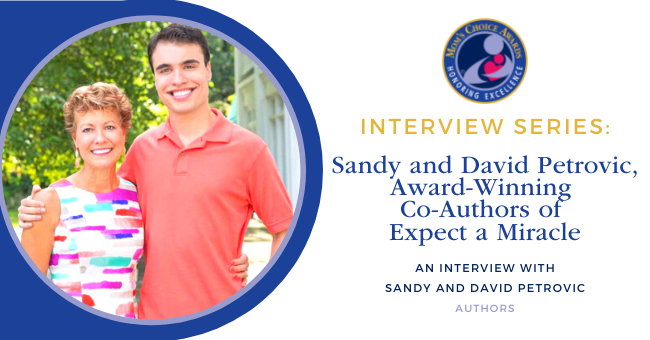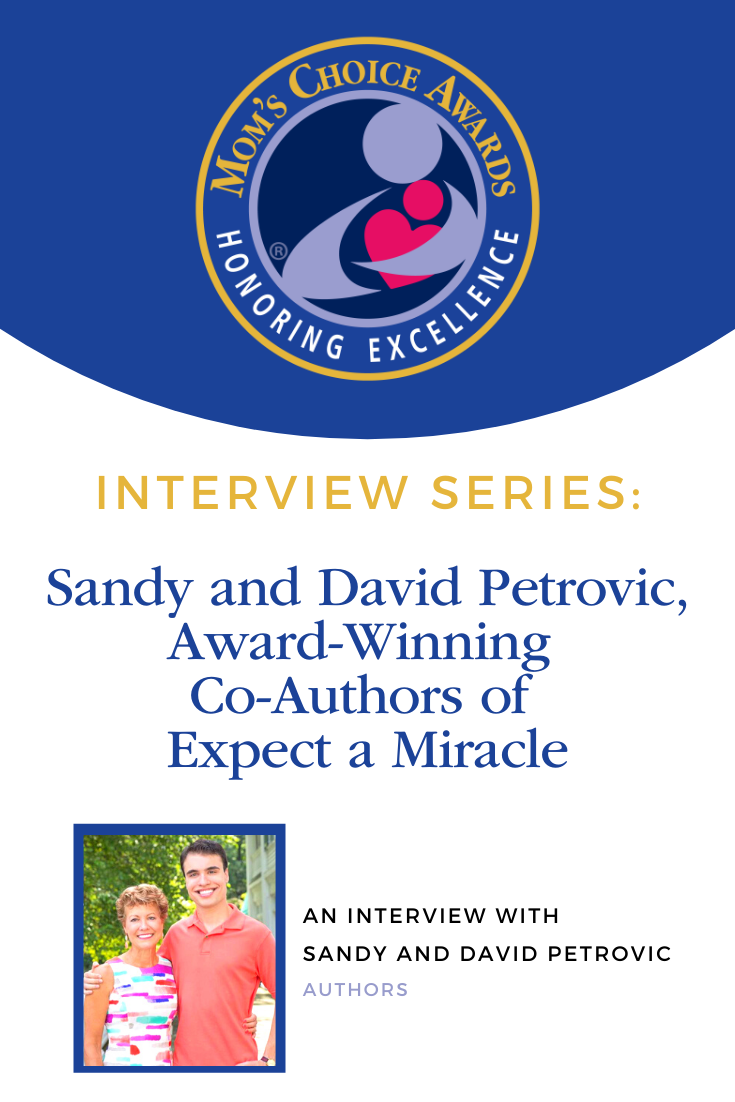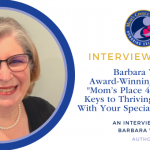Mom’s Choice Awards is excited to announce another post in our interview series where we chat with the inventors, designers, publishers, and others behind some of our favorite family-friendly products.
Hello, Mom’s Choice readers! Thank you for joining us for another interview in our series. For this interview, we were able to sit down with not just one but two of our MCA honorees, Sandy Petrovic and David Petrovic! Sandy and David Petrovic are the mother and son duo that co-authored the Mom’s Choice Award-winning book, Expect a Miracle! Written from the separate perspectives of an autistic young adult and his mother, Expect a Miracle enables an intricate understanding of life with autism. It uniquely chronicles the challenges and victories of each developmental stage from toddlerhood through young adulthood and includes topics such as bullying, sensory challenges, transitioning, college preparation and success, and acclimation to employment. Inspiring hope and practical ideas, this book would be valuable to those with Autism Spectrum Disorder/Asperger’s, their parents and loved ones, and professionals who work with autistic individuals in any way. It would also benefit employers, co-workers, and anyone interested in autism. Keep reading to find out more about Sandy and David Petrovic and their inspiring book, Expect a Miracle!
MCA: Hi Sandy and David! Thank you so much for sitting down with us today to discuss your multi-award-winning book, Expect a Miracle. Expect a Miracle is such an inspiring and impactful book that really helps the reader see autism in a new light. It is a beautifully written book about expectations, obstacles, acceptance, community, and love. I’d first like to start the interview by finding out a little bit about the lives behind such a powerful book. Tell us about yourselves!
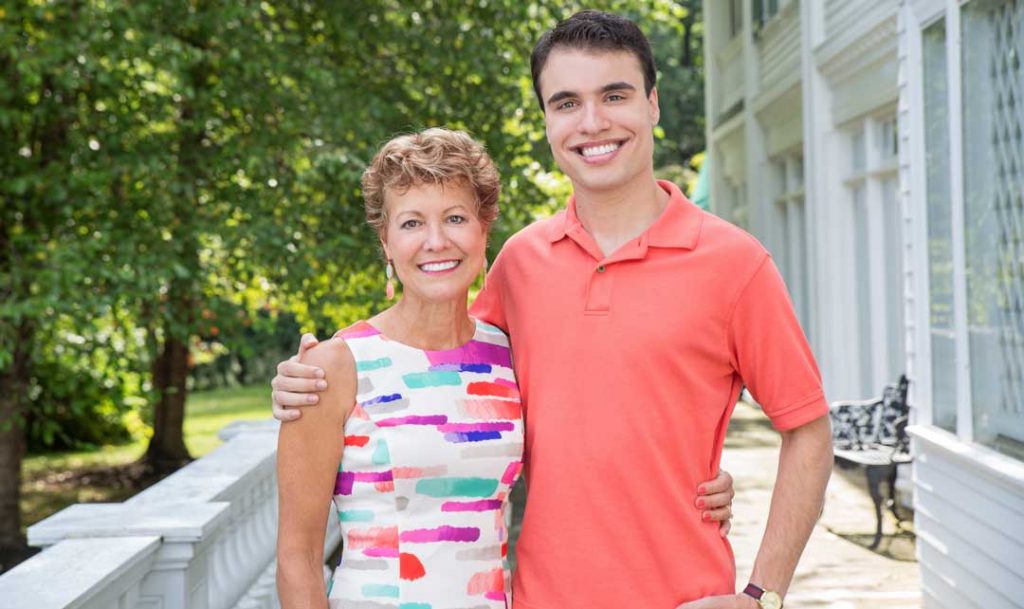
Sandy Petrovic and David Petrovic, co-authors of “Expect a Miracle.”
Sandy: I am the proud mother of three wonderful men and live in a suburb of Cleveland, OH with my husband of 42 years. Professionally, I am a registered nurse with past specialties in critical care nursing and diabetes education. But for the past six years, I have combined my passions of nursing and student coaching by working as an instructional advisor and tutor in a college academic support center for students with learning differences…the same center that enhanced David’s undergraduate experience. I am a public speaker alongside my son when requested or fitting for the audience. I am on the executive committee and a past co-chair of the annual Milestones National Autism Conference. My greatest joy is in spending time with my out-of-town grandchildren, and reading and exercise are also passions of mine.
David is my youngest son and was diagnosed with autism in steps as he aged, with differences evident after 15 months. Though he virtually had no speech at age three, he is now amazingly a national speaker, including his presentation of a TEDx Talk. Despite special needs schooling until eighth grade, he graduated cum laude undergraduate and received a master’s degree in theology in 2020. David is a middle school teacher with certifications in English/Language Arts and social studies, and he teaches junior high. His passion is theater, both as an actor and spectator, and this passion has been therapeutic on many levels since first grade.
Besides co-authoring this book, we also wrote a chapter in Life After Lockdown: Resetting Perceptions of Autism (2021). We have written many magazine articles and blogs, together and separately, and have participated in interviews in other media, such as newspapers, TV, and podcasts.
MCA: It is so wonderful that you both were able to combine your passions to create something so impactful. It sounds like you both have a very special bond! What were your inspirations for becoming authors?
Sandy: Life circumstances inspired us. As David reached his later high school years, my husband repeatedly encouraged us to write a book. He believed that our experiences and learned lessons could help other autistic people and families and could also educate providers and educators straight from the source. One thing led to another. It is now our mission, through our speaking and writing, to foster understanding and embracement of autism and diversity—both in self as well as in others.
MCA: Was it through that mission to foster understanding and embracement of autism and diversity that lead you both in your purpose for writing Expect a Miracle?
Sandy: I had so many purposes in taking on this challenge. Primarily, I wanted to give people the hope that I sought in the early ’90s that my little boy would be happy and could achieve and learn. I wanted to educate people not only on the challenges but also on the victories and gifts of autism. I wanted to reveal realities and potentials. I wanted to break stereotypes and barriers. I wanted people to understand and accept David, and most importantly, I wanted people to give him (and others with autism) a chance.
David: My motivations were many. The most significant to me is the following: to give people going through any kind of hardship hope and assurance that some sort of purpose can be brought about by going through that difficulty. I also wanted to validate that ALL lives are worthwhile, regardless of differences or circumstances
MCA: You really get a sense of those purposes while reading Expect a Miracle, with the big takeaways being that everyone has gifts that should be highlighted, recognized, and championed! You both talk about wanting to break the stereotypes and barriers that are often associated with autism. Can you discuss with us some of the common myths and misconceptions about Autism Spectrum Disorder?
Sandy: People often have a single picture or assumption of what autism is. That sets up stereotypes. They often think that autistic people are not intelligent or capable. People often make assumptions based on certain outward characteristics rather than trying to get to know the person within. Everyone with autism is different from every other person with autism. And just because an autistic person may not learn something in the same way that typical people can learn, it doesn’t mean they cannot learn. Just because some autistic people are nonverbal, it doesn’t mean they cannot communicate, or do not have other strengths and abilities. Autism is called a spectrum disorder for a reason. Many autistic people possess gifts and talents that far exceed the norm.
David: Most people have a stereotype in their minds regarding how autistic people look, how they behave, how they carry themselves, and what they can achieve. When this extends to professionals who present bleak prognoses of autistic people, they can overlook the tenacity of the human spirit. Everyone is a different individual with different mindsets, work ethics, and resources. When respected persons tell parents or autistic people that they will never amount to much or be able to achieve something—such as going to college or holding a job—it can be very damaging. The consequences of hearing this can go either way: The parent can either say, “Why bother?” and not put forth the maximum effort, or the parent can persist to prove the cynics wrong. Hearing a pessimistic prognosis from an accomplished individual can trickle down to the diagnosed child and ruin self-esteem. As a society, we often underestimate the minds of children in terms of what they absorb and comprehend; it is often misconceived that they are not listening or cannot understand. All of this has an impact on how the children move forward with their lives and handle certain situations. Only dwelling on the potential limitations of an individual can be a form of sabotage and create a self-fulfilling prophecy. As people, we all have a destiny that I believe we have control over. In a world where people with differences are given the short end of the stick, I want to give them their power back by presenting a different and more positive insight regarding their outcomes if they work hard, persevere, learn from their mistakes, and accept help and support as needed. I tried to convey this with my own life experiences in Expect a Miracle, and I stress these themes in my public speaking, as well.
MCA: That is all so insightful, thank you both so much for sharing that! Can you share with us some of the practical suggestions that worked for you to aid with some of the challenges of autism that are featured within Expect a Miracle?
Sandy: Each of our chapters ends with “lessons we learned” about the developmental stage presented and contains specific practical tips that helped us at that time. But to summarize, these are some general things that worked for us—and still help David in adulthood:
- Finding a supportive team (that changed with time and circumstances)
- Preparing David with explanations or demonstrations for each new experience or change
- Providing a period of transition for each new experience and change
- Advocating for David and transitioning him to advocate for himself
- Finding accommodations and teaching styles that worked for David in terms of sensory and learning challenges
- Encouraging David to explore his passions and find his own way after giving him the tools to do so.
MCA: What are some of the key lessons found in Expect a Miracle?
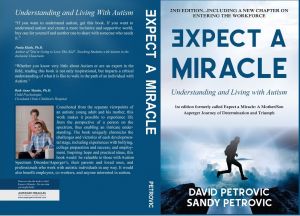
Cover of the MCA Award-winning Book, “Expect a Miracle.”
Sandy: Some of the key lessons that can be found in Expect a Miracle are:
- Differences are just that…differences. They do not make a person less right or less worthy.
- EVERYONE has strengths and weaknesses
- Never say never—David has astounded us time and again with accomplishing dreams and feats we never thought him possible of achieving. (In fact, his accomplishments extend beyond those that many typical people achieve.)
- Celebrate and own your differences; be true to yourself.
- Many positives come with being autistic!
- Raising a child with special needs is joyful!
David: Go for the life that you want—not one that people expect you to live because you have “a disability.”
MCA: From the reviews I’ve seen online for Expect a Miracle I think it’s safe to say it is a 5 star read all around. Can you tell us what some of those reviews have been like?
Sandy and David: We have received overwhelming support and validation that we achieved our goals in writing the book! Parents have reported a much deeper appreciation for what their children are going through and take comfort and ideas from similarities with our stories. Even my husband understood David better after reading our book. Professionals such as teachers and therapists have expressed a deeper understanding and empathy beyond what academic books and coursework provided. Our book enables readers to experience autism, which is totally different than just reading about it objectively from a distance. Getting into David’s mind and heart make all the difference. And amazingly—just as David had intended—many readers confirm that the benefits extend to differences and diagnoses beyond autism. Many of the issues and tips we discuss can be adapted to other challenges. Whether you are in the autism field or know nothing about it, Expect a Miracle can enlighten each reader in some meaningful way.
MCA:
You can learn more about Sandy and David Petrovic and their award-winning product, Expect a Miracle by visiting their MCA Shop pages.

